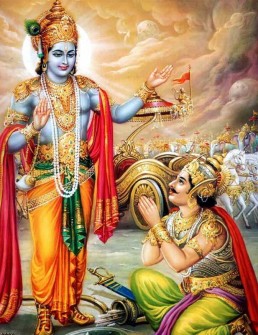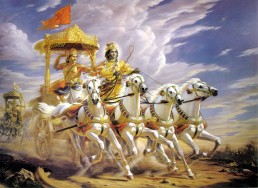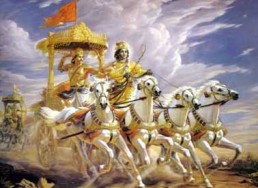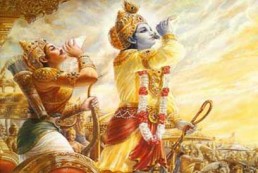Bhagavad Gita-Chapter 14 All Verses with Meaning and Audio
परं भूयः प्रवक्ष्यामि ज्ञानानां ज्ञानमुत्तमम् ।
यज्ज्ञात्वा मुनयः सर्वे परां सिद्धिमितो गताः ॥ १४-१॥
paraṃ bhūyaḥ pravakṣyāmi jñānānāṃ jñānamuttamam
yajjñātvā munayaḥ sarve parāṃ siddhimito gatāḥ 14-1
सर्गेऽपि नोपजायन्ते प्रलये न व्यथन्ति च ॥ १४-२॥
sarge’pi nopajāyante pralaye na vyathanti ca 14-2
सम्भवः सर्वभूतानां ततो भवति भारत ॥ १४-३॥
sambhavaḥ sarvabhūtānāṃ tato bhavati bhārata 14-3
तासां ब्रह्म महद्योनिरहं बीजप्रदः पिता ॥ १४-४॥
tāsāṃ brahma mahadyonirahaṃ bījapradaḥ pitā 14-4
निबध्नन्ति महाबाहो देहे देहिनमव्ययम् ॥ १४-५॥
nibadhnanti mahābāho dehe dehinamavyayam 14-5
सुखसङ्गेन बध्नाति ज्ञानसङ्गेन चानघ ॥ १४-६॥
sukhasaṅgena badhnāti jñānasaṅgena cānagha 14-6
तन्निबध्नाति कौन्तेय कर्मसङ्गेन देहिनम् ॥ १४-७॥
tannibadhnāti kaunteya karmasaṅgena dehinam 14-7
प्रमादालस्यनिद्राभि स्तन्निबध्नाति भारत ॥ १४-८॥
pramādālasyanidrābhi stannibadhnāti bhārata 14-8
ज्ञानमावृत्य तु तमः प्रमादे सञ्जयत्युत ॥ १४-९॥
jñānamāvṛtya tu tamaḥ pramāde sañjayatyuta 14-9
रजः सत्त्वं तमश्चैव तमः सत्त्वं रजस्तथा ॥ १४-१०॥
rajaḥ sattvaṃ tamaścaiva tamaḥ sattvaṃ rajastathā 14-10
ज्ञानं यदा तदा विद्याद्विवृद्धं सत्त्वमित्युत ॥ १४-११॥
jñānaṃ yadā tadā vidyādvivṛddhaṃ sattvamityuta 14-11
रजस्येतानि जायन्ते विवृद्धे भरतर्षभ ॥ १४-१२॥
rajasyetāni jāyante vivṛddhe bharatarṣabha 14-12
तमस्येतानि जायन्ते विवृद्धे कुरुनन्दन ॥ १४-१३॥
tamasyetāni jāyante vivṛddhe kurunandana 14-13
तदोत्तमविदां लोकानमलान्प्रतिपद्यते ॥ १४-१४॥
tadottamavidāṃlokān amalānpratipadyate 14-14
तथा प्रलीनस्तमसि मूढयोनिषु जायते ॥ १४-१५॥
tathā pralīnastamasi mūḍhayoniṣu jāyate 14-15
रजसस्तु फलं दुःखमज्ञानं तमसः फलम् ॥ १४-१६॥
rajasastu phalaṃ duḥkhamajñānaṃ tamasaḥ phalam 14-16
प्रमादमोहौ तमसो भवतोऽज्ञानमेव च ॥ १४-१७॥
pramādamohau tamaso bhavato’jñānameva ca 14-17
जघन्यगुणवृत्तिस्था अधो गच्छन्ति तामसाः ॥ १४-१८॥
jaghanyaguṇavṛttisthā adho gacchanti tāmasāḥ 14-18
गुणेभ्यश्च परं वेत्ति मद्भावं सोऽधिगच्छति ॥ १४-१९॥
guṇebhyaśca paraṃ vetti madbhāvaṃ so’dhigacchati 14-19
जन्ममृत्युजरादुःखैर्विमुक्तोऽमृतमश्नुते ॥ १४-२०॥
janmamṛtyujarāduḥkhair vimukto’mṛtamaśnute 14-20
कैर्लिङ्गैस्त्रीन्गुणानेता नतीतो भवति प्रभो ।
किमाचारः कथं चैतांस्त्रीन्गुणानतिवर्तते ॥ १४-२१॥
kairliṅgaistrīnguṇānetā natīto bhavati prabho
kimācāraḥ kathaṃ caitāṃ strīnguṇānativartate 14-21
प्रकाशं च प्रवृत्तिं च मोहमेव च पाण्डव ।
न द्वेष्टि सम्प्रवृत्तानि न निवृत्तानि काङ्क्षति ॥ १४-२२॥
prakāśaṃ ca pravṛttiṃ ca mohameva ca pāṇḍava
na dveṣṭi sampravṛttāni na nivṛttāni kāṅkṣati 14-22
गुणा वर्तन्त इत्येवं योऽवतिष्ठति नेङ्गते ॥ १४-२३॥
guṇā vartanta ityevaṃ yo’vatiṣṭhati neṅgate 14-23
तुल्यप्रियाप्रियो धीरस्तुल्यनिन्दात्मसंस्तुतिः ॥ १४-२४॥
tulyapriyāpriyodhīrah stulyanindātmasaṃstutiḥ 14-24
सर्वारम्भपरित्यागी गुणातीतः स उच्यते ॥ १४-२५॥
sarvārambhaparityāgī guṇātītaḥ sa ucyate 14-25
स गुणान्समतीत्यैतान् ब्रह्मभूयाय कल्पते ॥ १४-२६॥
sa guṇānsamatītyaitān brahmabhūyāya kalpate 14-26
शाश्वतस्य च धर्मस्य सुखस्यैकान्तिकस्य च ॥ १४-२७॥
ॐ तत्सदिति श्रीमद्भगवद्गीतासूपनिषत्सु
ब्रह्मविद्यायां योगशास्त्रे श्रीकृष्णार्जुनसंवादे
गुणत्रयविभागयोगो नाम चतुर्दशोऽध्यायः ॥ १४॥
śāśvatasya ca dharmasya sukhasyaikāntikasya ca 14-27
oṃ tatsaditi śrīmadbhagavadgītāsūpaniṣatsu
brahmavidyāyāṃ yogaśāstre śrīkṛṣṇārjunasaṃvāde
guṇatrayavibhāgayogo nāma caturdaśo’dhyāyaḥ 27

Description
Bhagavad Gita Chapter 14 Summary
Guṇa-Traya-Vibhāga-Yoga – The Yoga of the Threefold Modalities
Verses 1 – 4
Introduction
Verses 5 – 18
Analysis of guṇas
Verses 19 – 20
Knowledge as the means to transcend the guṇas
Verses 21 – 27
Guṇatīta-lakṣaṇam and sādhanam
Gita Chapter 14 – Commentary by Swami Paramarthananda
Background
In the 13th chapter, Lord Krishna said that it is the association with the guṇas of prakṛti that is responsible for rebirth i.e. saṃsāra (XIII-22). In this chapter, the Lord deals with this topic elaborately and shows how one can be free from these binding guṇas.
In the first two verses Krishna praises Self-knowledge to draw Arjuna’s attention. It is the greatest knowledge which takes one to the greatest goal of liberation. By this knowledge, one attains the nature of God Himself and thus becomes free from birth and death.
In the next two verses, Krishna gives a brief account of creation. Blessed by the Lord (puruṣa), prakṛti gives birth to this universe. Thus, they are the universal parents from whom all things and beings originate.
From the 5th to the 18th verse, Bhagavān makes an elaborate analysis of the three guṇas — sattva, rajas and tamas. They are born of prakṛti and are responsible for the human bondage. The Lord analyses them from various angles which can be depicted in the form of a chart.
Even though all the beings have the three guṇas, they differ because of the predominance of one guṇa over the other two. (It is also possible to change the proportions for which alone all the preparatory sādhanās are prescribed) (10).
In the 19th and 20th verses, Krishna teaches the means of transcending the guṇas. The Lord points out that the transcendence is in the form of knowledge alone. The Self (puruṣa) happens to be already beyond the guṇas (guṇātīta). It is the body (prakṛti) which has guṇas, doership, etc. Because of identification with the body alone, the Self (puruṣa) seems to have guṇas. Hence the only solution is to discriminate and own up the guṇātīta puruṣa as oneself (19). Through this knowledge, one discovers oneself to be free from birth, death, etc. This is liberation (20).
Arjuna asks Krishna about the characteristics of a guṇātīta and the sādhanā to achieve this (21).
From the 22nd to the 25th verse, Krishna answers the first question. Guṇatīta is one who is detached from prakṛti. He does not have I-notion in his body or my-notion in the world. Hence, he looks at the variations of guṇas objectively without reacting to them (22). He remains unaffected by the opposite experiences of life like pleasure-pain, praise-censure, honour-dishonour, etc. They are the play of prakṛti (23, 24). Being full, he does not seek anything and therefore is free from selfish activities (25). (Since a guṇātīta is invariably a wise man, this description tallies with the sthitaprajña portion of the 2nd chapter as well as the parābhakta portion of the 12th chapter).
Krishna concludes by prescribing bhakti as the sādhanā to achieve this goal. (Thus, the Lord answers Arjuna’s second question. By the grace of the Lord one gets a guru. Through the guru, one gets the knowledge which makes one guṇātīta). A bhakta becomes fit to attain Brahman’s nature (guṇātītatvam) which is immortality and absolute ānanda (26, 27).
To gain this knowledge, one has to purify the mind through karma-yoga, gain knowledge through enquiry (sāṅkhya-yoga), and ultimately get established in the knowledge through dhyānayoga (25 and 26).
Gita 14th Chapter – Main Points
Introduction: 1 to 4
Analysis of guṇas: 5 to 18
Knowledge as the means to transcend the guṇas: 19 to 20
Guṇatīta-lakṣaṇam and sādhanam: 21 to 27
Since the main topic here is the discrimination of the three guṇas and the Self (puruṣa), this chapter is called Guṇatraya vibhāga yoga.
Other Bhagavad Gita Shlokams
Bhagavad Gita
The Bhagavad Gita, or the Song of the Lord, is a dialogue between Krishna, an incarnation of Vishnu, and his friend and disciple, Arjuna. Composed of 701 Shlokas arranged in 18 chapters, the Gita is one of the best-known philosophical texts of…
Bhagavad Gita-Chapter 01 All Verses with Meaning and Audio
Bhagavad Gita Chapter 1 All Verses for easy chanting along with Audio and Meaning. Lyrics In English, Sanskrit, Hindi, Telugu, Tamil, Gujarati, Bengali and many more languages.
Bhagavad Gita-Chapter 02 All Verses with Meaning and Audio
Bhagavad Gita Chapter 2 All Verses for easy chanting along with Audio and Meaning. Lyrics In English, Sanskrit, Hindi, Telugu, Tamil, Gujarati, Bengali and many more languages.
Bhagavad Gita-Chapter 03 All Verses with Meaning and Audio
Bhagavad Gita Chapter 3 All Verses for easy chanting along with Audio and Meaning. Lyrics In English, Sanskrit, Hindi, Telugu, Tamil, Gujarati, Bengali and many more languages.
Bhagavad Gita-Chapter 04 All Verses with Meaning and Audio
Bhagavad Gita Chapter 4 All Verses for easy chanting along with Audio and Meaning. Lyrics In English, Sanskrit, Hindi, Telugu, Tamil, Gujarati, Bengali and many more languages.
Bhagavad Gita-Chapter 05 All Verses with Meaning and Audio
Bhagavad Gita Chapter 5 All Verses for easy chanting along with Audio and Meaning. Lyrics In English, Sanskrit, Hindi, Telugu, Tamil, Gujarati, Bengali and many more languages.
Bhagavad Gita-Chapter 06 All Verses with Meaning and Audio
Bhagavad Gita Chapter 6 All Verses for easy chanting along with Audio and Meaning. Lyrics In English, Sanskrit, Hindi, Telugu, Tamil, Gujarati, Bengali and many more languages.
Bhagavad Gita-Chapter 07 All Verses with Meaning and Audio
Bhagavad Gita Chapter 7 All Verses for easy chanting along with Audio and Meaning. Lyrics In English, Sanskrit, Hindi, Telugu, Tamil, Gujarati, Bengali and many more languages.
Bhagavad Gita-Chapter 08 All Verses with Meaning and Audio
Bhagavad Gita Chapter 8 All Verses for easy chanting along with Audio and Meaning. Lyrics In English, Sanskrit, Hindi, Telugu, Tamil, Gujarati, Bengali and many more languages.
Bhagavad Gita-Chapter 09 All Verses with Meaning and Audio
Bhagavad Gita Chapter 9 All Verses for easy chanting along with Audio and Meaning. Lyrics In English, Sanskrit, Hindi, Telugu, Tamil, Gujarati, Bengali and many more languages.
Bhagavad Gita-Chapter 10 All Verses with Meaning and Audio
Bhagavad Gita Chapter 10 All Verses for easy chanting along with Audio and Meaning. Lyrics In English, Sanskrit, Hindi, Telugu, Tamil, Gujarati, Bengali and many more languages.
Bhagavad Gita-Chapter 11 All Verses with Meaning and Audio
Bhagavad Gita Chapter 11 All Verses for easy chanting along with Audio and Meaning. Lyrics In English, Sanskrit, Hindi, Telugu, Tamil, Gujarati, Bengali and many more languages.
Bhagavad Gita-Chapter 12 All Verses with Meaning and Audio
Bhagavad Gita Chapter 12 All Verses for easy chanting along with Audio and Meaning. Lyrics In English, Sanskrit, Hindi, Telugu, Tamil, Gujarati, Bengali and many more languages.
Bhagavad Gita-Chapter 13 All Verses with Meaning and Audio
Bhagavad Gita Chapter 13 All Verses for easy chanting along with Audio and Meaning. Lyrics In English, Sanskrit, Hindi, Telugu, Tamil, Gujarati, Bengali and many more languages.
Bhagavad Gita-Chapter 15 All Verses with Meaning and Audio
Bhagavad Gita Chapter 15 All Verses for easy chanting along with Audio and Meaning. Lyrics In English, Sanskrit, Hindi, Telugu, Tamil, Gujarati, Bengali and many more languages.
Bhagavad Gita-Chapter 16 All Verses with Meaning and Audio
Bhagavad Gita Chapter 16 All Verses for easy chanting along with Audio and Meaning. Lyrics In English, Sanskrit, Hindi, Telugu, Tamil, Gujarati, Bengali and many more languages.
Bhagavad Gita-Chapter 17 All Verses with Meaning and Audio
Bhagavad Gita Chapter 17 All Verses for easy chanting along with Audio and Meaning. Lyrics In English, Sanskrit, Hindi, Telugu, Tamil, Gujarati, Bengali and many more languages.
Bhagavad Gita-Chapter 18 All Verses with Meaning and Audio
Bhagavad Gita Chapter 18 All Verses for easy chanting along with Audio and Meaning. Lyrics In English, Sanskrit, Hindi, Telugu, Tamil, Gujarati, Bengali and many more languages.
Gita Dhyanam
The Gītā Dhyānam, also called the Gītā Dhyāna or the Dhyāna Ślokas associated with the Gītā, is a 9-verse Sanskrit poem that has often been attached to the Bhagavad Gita, one of the most important scr
Bhagavad Gita-Chapter 14 All Verses with Meaning and Audio – Bhagavad Gita – Bhagavad Gita Chapter 14 All Verses Easy Chanting with Audio and Meaning, Lyrics




